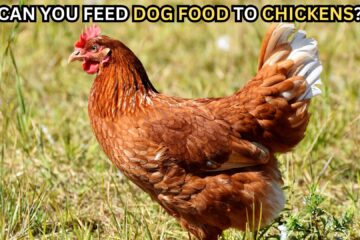As a responsible pet owner, understanding the intricacies of dog nutrition is crucial in ensuring the health and well-being of your furry friend. Selecting the right dog food is more than just a choice; it’s a commitment to their overall health and happiness.
One emerging question among dog owners is about the effects of specific dog food brands on their pet’s digestive health, particularly concerning constipation.
In this light, a prevalent query arises: Does Ollie dog food cause constipation in dogs?
This blog post aims to delve into this pressing concern, providing insights grounded in nutritional facts, expert veterinary opinions, and real-world user experiences.
Our goal is to offer a well-rounded perspective to help you make informed decisions about your dog’s diet.
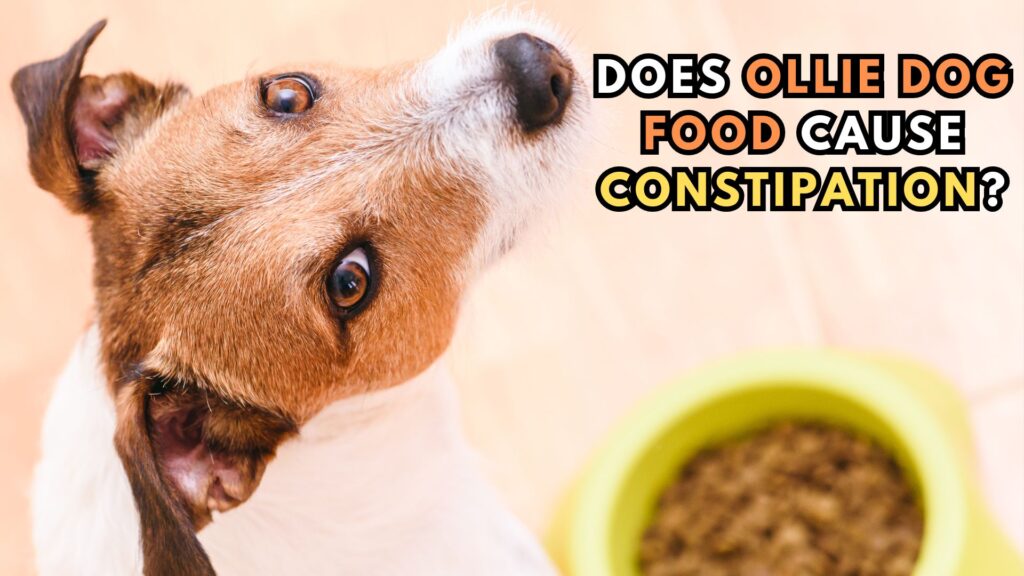
🤔🐕Understanding Dog Constipation
Before diving into the specifics of Ollie dog food, let’s first understand what constipation in dogs looks like.
Constipation refers to the infrequent or difficult evacuation of stools, which can be a distressing condition for any dog.
Common symptoms include;
- straining to defecate
- passing hard or dry stools
- less frequent bowel movements
The causes of constipation in dogs are varied, ranging from dietary issues and dehydration to underlying health conditions.
Factors such as a lack of fiber in the diet, insufficient water intake, or a sedentary lifestyle can contribute significantly to this problem. It’s essential to identify the root cause to treat constipation effectively.
Overview of Ollie Dog Food
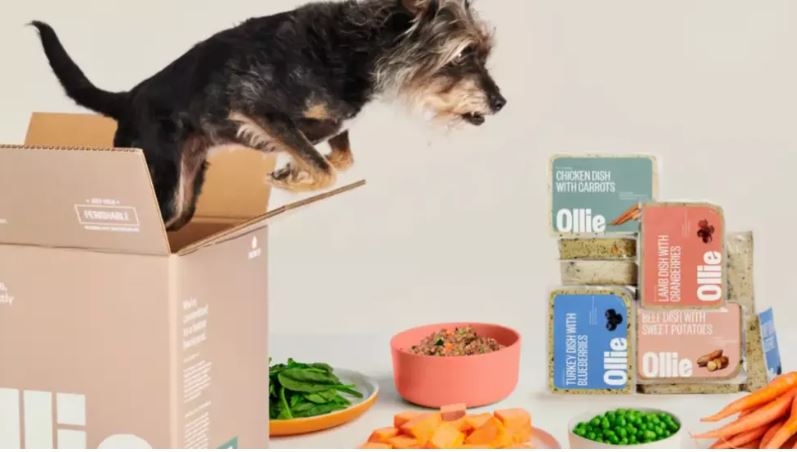
Ollie is a brand that has gained attention in the pet food market for its customized, fresh dog meals.
These meals are tailored to the unique needs of each dog, based on factors like age, breed, and activity level. The ingredients in Ollie dog food typically include a mix of high-quality meats, vegetables, fruits, and added supplements for balanced nutrition.
The nutritional claims of Ollie dog food are centered around its use of whole, human-grade ingredients, designed to provide complete and balanced nutrition for dogs.
The brand emphasizes the absence of fillers, artificial flavors, or preservatives, which are often seen in conventional dog foods. This focus on natural, wholesome ingredients is a key aspect of Ollie’s appeal to health-conscious pet owners.
Can Dog Food Cause Constipation?
The relationship between a dog’s diet and its digestive health is intricate and significant. Certain types of dog food can indeed contribute to constipation, a common digestive issue among dogs.
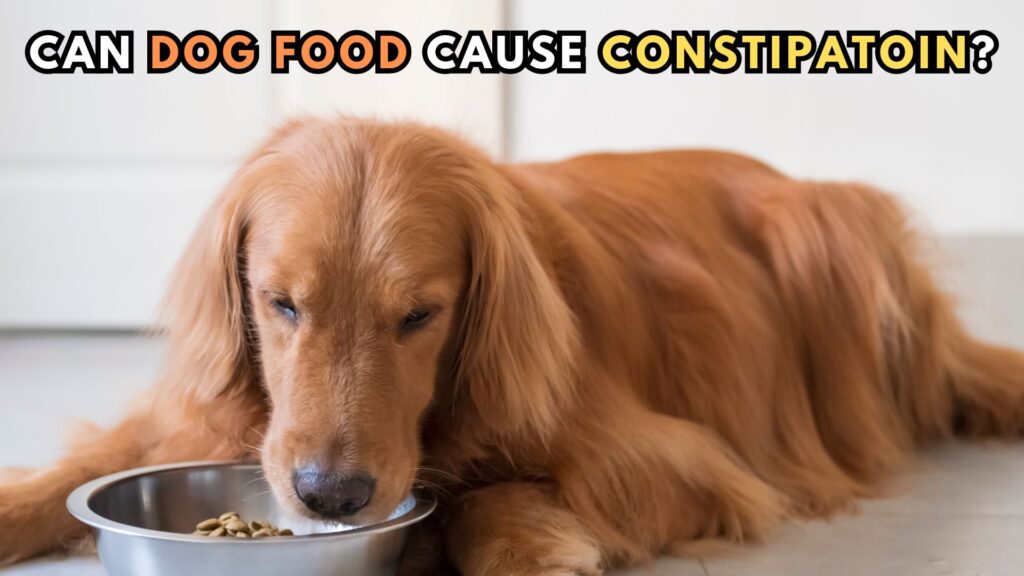
The key factors in dog food that can lead to constipation include:
- Low Fiber Content: Fiber plays a crucial role in maintaining regular bowel movements. Dog foods low in fiber can lead to harder stools, making them difficult to pass.
- High Grain Content: While grains are not inherently bad, some dogs may have difficulty digesting high grain content, especially if they are not used to it or if the grains are of lower quality.
- Inadequate Hydration: Moisture in dog food aids in digestion. Dry kibbles, if not supplemented with enough water, can lead to dehydration and consequently, constipation.
- Excessive Calcium or Bone Meal: Diets high in bone meal or calcium can lead to denser, harder stools.
Understanding these factors is essential in choosing the right food for your dog to prevent and manage constipation.
Analyzing Ollie Dog Food’s Ingredients
Ollie dog food is known for its high-quality, human-grade ingredients, which are tailored to meet the specific nutritional needs of each dog.

Let’s break down some key components:
- Protein Sources (e.g., Chicken, Beef, Lamb): High-quality protein is crucial for a dog’s muscle maintenance and overall health. However, excessive red meat without a balance of fiber can sometimes contribute to harder stools.
- Vegetables (e.g., Sweet Potatoes, Peas, Spinach): These are excellent sources of dietary fiber and essential vitamins. Fiber from vegetables helps in stool formation and promotes regular bowel movements.
- Carbohydrates (e.g., Rice, Potatoes): Carbs provide energy but need to be balanced. Too many carbohydrates, especially if low in fiber, can disrupt digestive regularity.
- Fruits (e.g., Blueberries, Pumpkin): Fruits like pumpkin are particularly beneficial for digestive health due to their high fiber content.
- Added Supplements (e.g., Fish Oil, Vitamins): Supplements in Ollie’s recipes aim to enhance overall nutrition. Fish oil, for example, can aid in digestion and stool quality.
- Moisture Content: Fresh, moisture-rich foods like those in Ollie’s range can aid in hydration, which is beneficial for preventing constipation.
In evaluating these ingredients, it appears that Ollie dog food is formulated to promote a balanced diet, which is generally beneficial for digestive health.
However, each dog’s reaction to different ingredients can vary. If a dog is not used to a rich or varied diet, even high-quality food like Ollie’s can initially cause digestive upset, including constipation.
It’s important to transition any dog food gradually and monitor your pet’s response to the new diet.
Can Ollie Dog Food Make Your Pooch Constipated?

The answer to this question is not Straightforward. While certain types of dog food can contribute to constipation, Ollie’s approach to using fresh, high-quality ingredients generally supports healthy digestion.
Nevertheless, individual responses can vary, and it’s crucial to consider each dog’s unique dietary needs and health status.
👩⚕️🐾Veterinarian Insights on Ollie Dog Food and Digestive Health
From a veterinary perspective, Ollie dog food is generally seen as a high-quality option that prioritizes natural, whole ingredients, which can be beneficial for a dog’s overall health, including their digestive system.
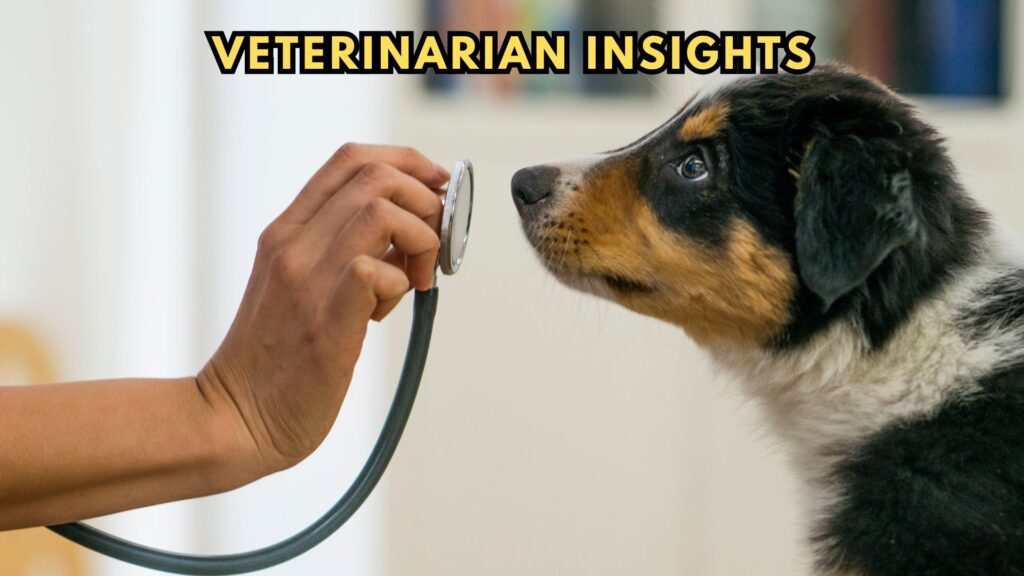
Here are some key points:
- Balanced Nutrition: Many veterinarians appreciate Ollie’s focus on balanced nutrition, which is crucial for maintaining a healthy digestive system.
- High-Quality Ingredients: The use of human-grade, whole ingredients in Ollie dog food can be easier on a dog’s digestive system compared to processed or artificial ingredients found in some other dog foods.
- Individual Responses: Veterinarians often note that each dog’s digestive system is unique. While Ollie dog food may be suitable for many dogs, some might experience digestive changes, including constipation, particularly during dietary transitions.
- Transition Period: Veterinarians usually recommend a gradual transition to new foods like Ollie to allow the dog’s digestive system to adjust, thereby reducing the risk of constipation or other digestive issues.
Managing and Preventing Constipation in Dogs
As a veterinarian, here are some tips to prevent and manage constipation in dogs:
- Dietary Fiber: Ensure the dog’s diet includes an appropriate amount of fiber. Pumpkin, wheat bran, and certain vegetables can be excellent sources.
- Hydration: Encourage regular water intake. Wet food or water added to dry food can help maintain hydration.
- Regular Exercise: Daily exercise is essential for keeping the digestive system active.
- Gradual Dietary Changes: When changing diets, do so gradually over a week or more to allow the digestive system to adjust.
- Monitoring: Keep an eye on your dog’s bowel movements, especially when changing diets or introducing new foods.
- Veterinary Consultation: If constipation persists or is accompanied by other symptoms like vomiting, lethargy, or loss of appetite, it’s crucial to consult a veterinarian. Chronic constipation could indicate an underlying health issue that needs professional attention.
❓FAQs: Ollie Dog Food and Canine Constipation
What are the signs of constipation in dogs?
- Difficulty defecating, infrequent bowel movements (less than once a day)
- Hard, dry stools
- Straining or discomfort during defecation
- Decreased appetite or lethargy (in severe cases)
How can I adjust my dog’s diet to prevent constipation?
- Increase dietary fiber: Adding pumpkin, beet pulp, or specially formulated fiber supplements can help.
- Ensure adequate hydration: Fresh water should always be available, and consider adding water to dry food.
- Gradual diet changes: Introduce new foods, including Ollie, slowly over several days to a week.
- Regular exercise: This stimulates digestion and helps maintain regular bowel movements.
Are there any specific ingredients in Ollie dog food known to cause digestive issues?
Ollie uses high-quality, wholesome ingredients, which are generally well-tolerated by most dogs.
However, any dietary change can cause temporary digestive upset. Ingredients like high-fat meats or certain vegetables might not suit every dog.
It’s important to note that each dog is unique. What causes issues in one dog may not in another.
📝Summary
In this article, we’ve explored the relationship between Ollie dog food and canine constipation. Key points to remember include:
- Importance of Diet: A balanced diet is vital for maintaining canine digestive health. High-quality ingredients, appropriate fiber content, and adequate hydration are essential components.
- Individual Responses: Each dog’s digestive system is unique, and responses to different diets, including Ollie dog food, can vary.
- Transitioning Diets: Gradually introducing new foods like Ollie is crucial to prevent digestive upset, including constipation.
- Monitoring and Consultation: Observe your dog’s digestive health when switching foods. Persistent constipation, or any notable change in bowel habits, warrants consultation with a veterinarian.
- Veterinary Guidance: Always consider personalized advice from a veterinarian, like myself, Dr. Xeeshan, when making decisions about your dog’s diet and health.
In conclusion, while Ollie dog food is generally beneficial for canine health due to its high-quality ingredients and balanced nutrition, it’s important to monitor your dog’s individual response and consult with a veterinarian for any concerns regarding constipation or other digestive issues.


